

Oscar Chun


First-Year Trips C912.1: Organic Farming
It was July 30th when a long-awaited email—First-Year Trips assignments—landed in my inbox. First-Year Trips (FYT)—often shortened to "trips"—are an optional portion of orientation, where you explore the surrounding woods through a themed activity. The Dartmouth Outing Club (DOC) has been running trips since 1935, and it has grown into a beloved orientation tradition. Although there is a trip registration fee, financial aid assistance is available. At Dartmouth, aid often extends outside of tuition assistance, including funding for student experiences such as trips!
About a month prior, I was able to pick between 30 trip types ranging from flatwater kayaking to cabin camping to museum exploration. The DOC offers a variety of trip difficulties and experience requirements to accommodate everyone, regardless of whether you have outdoor experience or not. In addition, the DOC offers a gear rental service, where students can request any necessary gear for free. However, something not on the FYT packing list is a phone—trippees are discouraged from bringing phones, to encourage connections among trip members. So most of the photos in this post were taken by my trip leaders (TLs), Anika '27, Jackie '27, and my trippee (term for fellow first-year students on FYT) with a digital camera, Xzana '28!
As you probably know from the title, my trip was organic farming at the O-Farm!
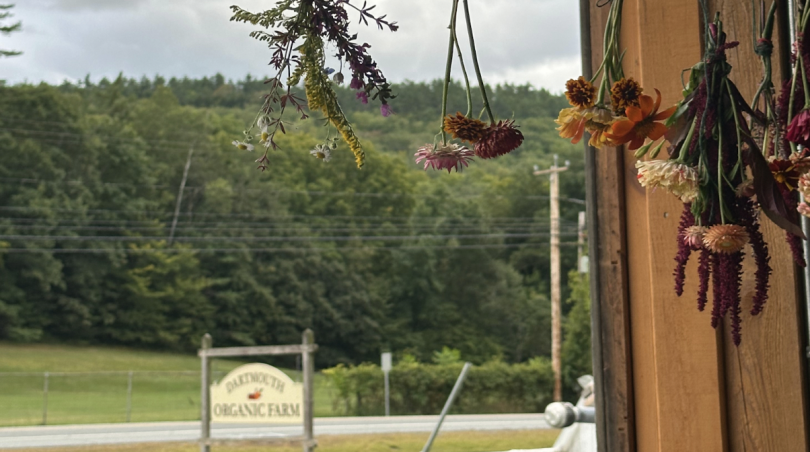
DAY 1:
When we arrived at the farm, we were greeted by the Farm interns, current students who work full-time on the farm, and the tour guides for our trip. The interns took us around the farm, explaining its history, points of interest, and what's currently going on. The O-Farm is an educational farm run by the interns and Farm Club, a space for student research and independent studies, and sometimes hosts classes for hands-on learning experiences. It's a really unique opportunity for research in action or just a place to get your hands dirty and take in views of the Connecticut River.
At the time, the farm work for the day was all done. So our first day was a lazy one—of napping and snacking on sesame sticks, summer sausage, and banana chips.

DAY 2:
Our second day began bright and early with weeding the fields. The O-Farm doesn't use pesticides or herbicides. Rather, the fields are planted using techniques that naturally deter pests and weeds, such as companion planting or tarping. But sometimes, the weeds still manage to get through—and that's where the students come in.
After our session of weeding, we got to harvest some tomatoes, zucchini, and peppers for our dinner later that night. Students who help at the farm are able to take part of their harvest back to campus—it's a great way to get locally grown produce in the college diet.
Once we finished our farm chores, we had the opportunity to explore the different projects going on at the farm. The Book Arts Workshop collaborates with the O-Farm to grow dye plants such as amaranth, marigolds, pokeberries, beets, and sumac berries, which can be processed into inks. We picked, crushed, and strained pokeberries and beets to create a bright purple dye to paint with.
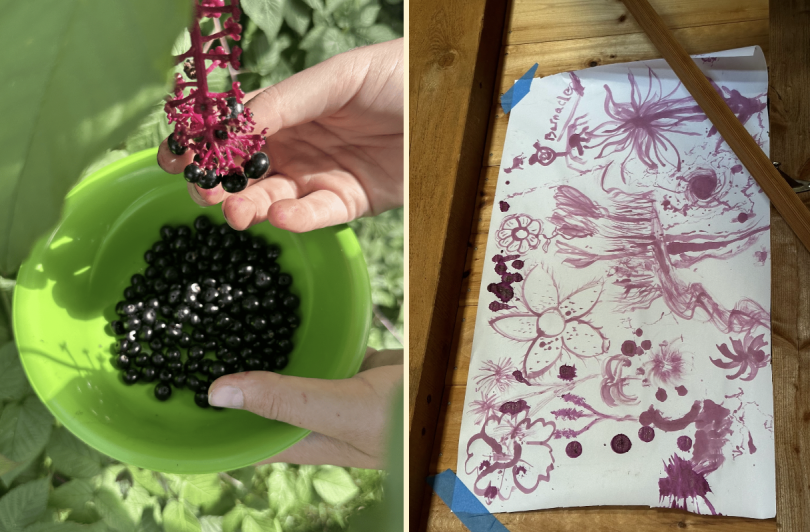
Later that night, we had the O-Farm's famous pizza dinner. Between the pizza, fresh vegetables from the farm, and snacks provided by the DOC, trip C921.1 ate really well on Day 2!
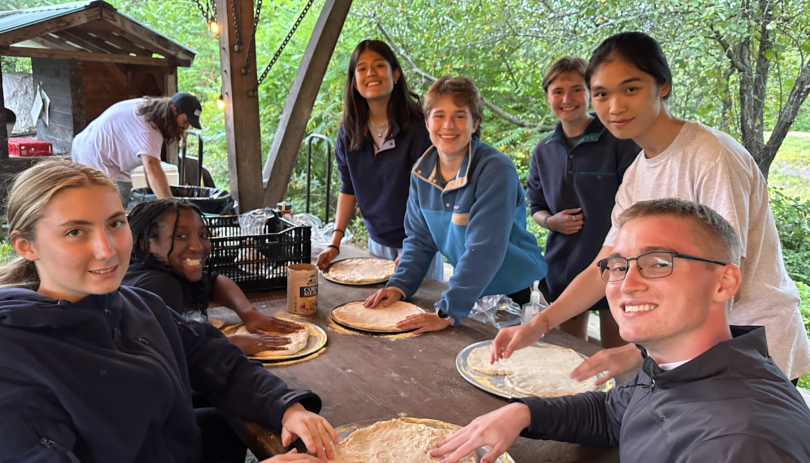

DAY 3:
Like yesterday, we started Day 3 with some farm chores: weeding, harvesting, and planting. But we got up to a little mischief, too! We planted kale and cabbage seedlings in a neighboring plot.
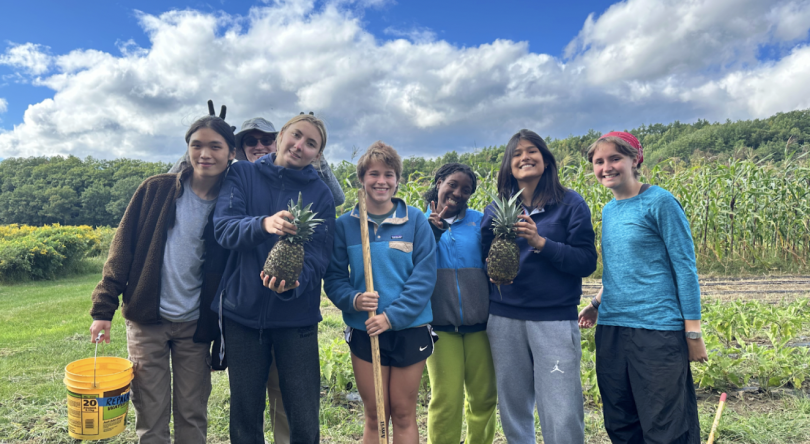
After a successful morning of planting, we decided to go on a short hike to Storr's Pond. The O-Farm sits in the middle of many public walking and hiking trails, offering plenty of opportunities to explore the nearby woods.
DAY 4:
Day 4 marked the end of our time spent on the O-Farm. It was a bittersweet goodbye, as although I love the O-Farm, I was eager to have a shower and sleep in a bed again. However, I would still have to wait until the end of trips, as our next stop was the Dartmouth Ski Lodge—known as Sklodj—for a reunion with other Section C trips.
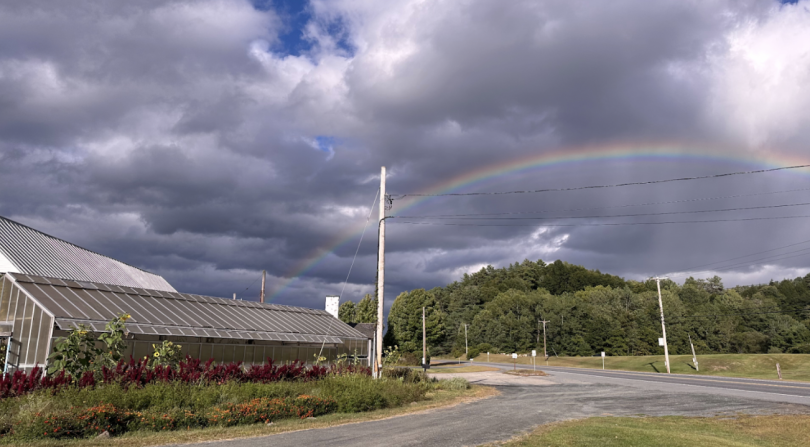
My First-Year Trip experience was a fantastic chance to try out the outdoors at Dartmouth. It was a great introduction to the Organic Farm and DOC activities, and I'll never forget it as my first time sleeping under the stars. While I probably won't be living on the farm for three days again, I'm hoping to continue exploring the O-Farm through Farm Club, maybe tapping maple syrup and many more pizza dinners. Stay tuned for more O-Farm adventures!

Posts You Might Like


Here's a list of some things I'm looking forward to this fall!


A thank you letter to my study abroad in Italy


Read on to learn about the Dartmouth Outing Club's Surf Club and my adventure to the Atlantic.


What does a study abroad look like inside and outside of the classroom?



If you're like I was—staring at your closet wondering what "essentials" actually means—here is what I packed, what I'm grateful I brought, and what I now know you can leave behind.


What orientation is like for first years at Dartmouth!


My time at the MFA, completely free of charge!

